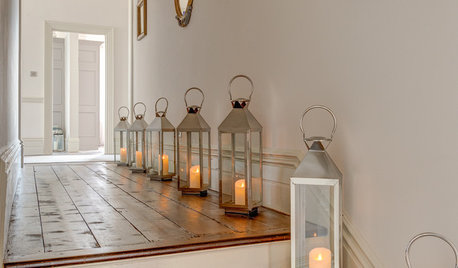Are you in the mood?
jankin
17 years ago
Related Stories

COLOR PALETTESSet the Mood: 4 Colors for a Romantic Bedroom
Bring your love of color — and the colors of love — into your master bedroom
Full Story
COLORSet the Mood: 5 Colors for a Calming Bedroom
Stressed? Can't sleep? Consider one of these cool, soothing hues for your walls
Full Story
COLOR9 Dark Wall Colors to Suit Your Mood
Tired of light and airy? Try dark and moody for a change; you may be surprised by the moods these colors inspire
Full Story
DECORATING GUIDESHow to Create a Mood With Tile
Set the tone for your space with tantalizing tile patterns and techniques
Full Story
The Many Moods of Leopard
Add a Little Big-Cat Print for a Touch of Luxury, Playfulness, and Surprise
Full Story
BOLD COLORDecorate With Intention: Lift a Room's Mood With Color
More than just a style statement, color choice can strongly affect our state of mind. Here's how to get the feeling you really want
Full Story
SHOP HOUZZShop Houzz: Mood Lighting
Add an irresistible glow to your home with the right lighting
Full Story
DECORATING GUIDES15 Ways to Get Your Home in a Summer Mood
Bask in the easygoing spirit of summer with breezy touches indoors and out
Full Story
COLORSet the Mood: 4 Colors for a Cozy Bedroom
Look to warm hues for that snuggle-friendly feeling
Full Story
LIGHTINGWelcome the Winter With Mood-Enhancing Lights
Relish the prospect of darker evenings with statement lighting to illuminate and inspire
Full Story


jankinOriginal Author
woodnymph2_gw
Related Discussions
Music question
Q
**They're here--the samples have arrived! Bill V look too!
Q
Favorite Kitchen Accessories?
Q
How do you creat a mood board?
Q
jankinOriginal Author
janalyn
friedag
jankinOriginal Author
anyanka
friedag
friedag
anyanka
jankinOriginal Author
woodnymph2_gw
dido1
veer
dido1
jankinOriginal Author
anyanka
dido1
dido1
anyanka
jankinOriginal Author
friedag
jankinOriginal Author
friedag
anyanka
woodnymph2_gw
jankinOriginal Author
friedag
friedag
ccrdmrbks
friedag
veer
woodnymph2_gw
cindydavid4
anyanka
dido1
woodnymph2_gw
friedag
ccrdmrbks
friedag
ccrdmrbks
jankinOriginal Author
jankinOriginal Author
friedag
woodnymph2_gw
dido1
friedag
dido1
jankinOriginal Author
friedag